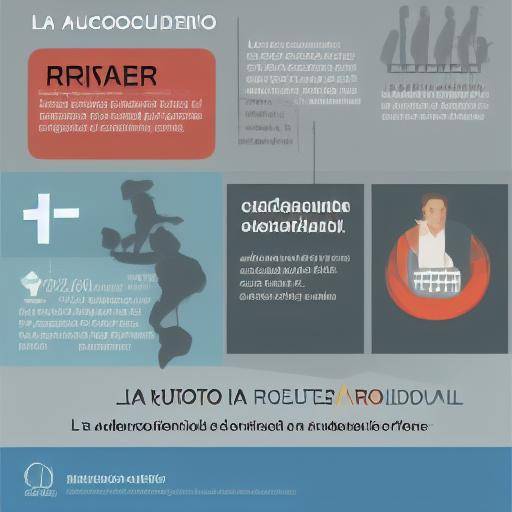
Work-life balance is crucial for the integral well-being of people. In today's society, marked by the constant connection and culture of productivity, it is essential to establish healthy limits to avoid exhaustion and preserve the quality of life. In this article, we will explore the importance of limits on work-life balance, its impact on integral well-being and offer practical advice to achieve a healthy balance.
Introduction
The work-life balance refers to the ability to manage labor and personal responsibilities harmoniously, allowing to enjoy a full and satisfactory life. At present, many professionals face challenges related to overwork, lack of time to devote to their personal well-being and the difficulty to disconnect from the working environment. These imbalances can have a negative impact on physical, mental and emotional health.
In this article, we will explore the importance of establishing healthy limits on work-life balance, analyze in detail how these limits contribute to integral well-being and provide practical strategies to implement them in everyday life.
History and background
The concept of work-life balance has evolved throughout history in response to changes in the working and social world. As technology has allowed greater connectivity, labour demands have transcended traditional boundaries, generating the need to reevaluate the relationship between work and personal life.
From the Industrial Revolution to the digital era, the notion of work-life balance has been shaped by labor movements, progress in conciliation policies, and cultural changes that have focused attention on the importance of the integral well-being of workers.
Example: The movement for the reduction of the working day, which emerges throughout the twentieth century in several countries, is a milestone in the search for balancing the time spent on work with free time and personal development.
In-depth analysis
The importance of healthy limits in work-life balance is manifested in multiple aspects of everyday life. Establishing clear limits and respecting them is essential to preserving physical and emotional health, fostering labour productivity, and cultivating healthy interpersonal relationships.
Lack of limits poses a significant risk to health and comprehensive well-being. Depletion, chronic stress and emotional disconnection are just some of the consequences of a lack of work-life balance.
Research shows that organizations that promote a culture that respects the limits of their employees experience higher levels of commitment, performance and job satisfaction.
Full review
To achieve a sustainable work-life balance, it is essential to consider not only the amount of time devoted to work and personal life, but also the quality of that time. Establishing healthy boundaries involves effectively managing the time spent on each area, setting clear priorities and learning to disconnect consciously.
Healthy limits directly contribute to integral well-being by allowing people to devote time and energy to activities that promote physical, emotional and social health. The ability to disconnect from work and devote time to rejuvenating activities is crucial to maintain a state of balance and satisfaction.
Comparative analysis
In the quest for work-life balance, it is essential to consider the interrelationship between the establishment of healthy limits and integral well-being. Both concepts are intrinsically linked, as healthy boundaries are a fundamental pillar for integral well-being.
Without healthy limits, work-life balance becomes an unattainable goal, and integral well-being is compromised. On the other hand, integral well-being, in considering physical, emotional and social aspects, can serve as a guide to establish clear and healthy limits that promote a balanced and satisfactory life.
Practical advice and recommendations
- Sets defined schedules: Dedicating specific time for work and for personal activities ensures a healthy balance.
- Learn to say "no": Accepting additional tasks at work can exhaust your resources and personal time.
- Disconnect: Set periods of disconnection from work to recharge energies and enjoy your free time.
- Practice self-care: Dedicate time regularly for self-care and activities that nourish you physically, emotionally and spiritually.
- Communicate your limits: Clearly express your needs and limits to your working and personal environment to be respected.
- Establish routines: Implement balanced daily routines that integrate work, recreation, rest and social connection.
Conclusion
The establishment of healthy limits in work-life balance is essential to ensuring comprehensive well-being. The ability to manage labour and personal responsibilities in a balanced manner, while preserving time for self-care and personal enjoyment, is crucial to maintain a full and satisfactory life.
By consciously implementing healthy boundaries, harmony between work and personal life is promoted, stress is reduced and a state of integral well-being is encouraged. Recognizing the importance of establishing healthy boundaries is the first step to start cultivating an enriching and sustainable work-life balance.
Frequently asked questions
Why is it important to set healthy limits on work-life balance?
The establishment of healthy limits allows the preservation of physical, emotional and mental health, while ensuring enjoyment and satisfaction in various areas of life.
What impact do healthy boundaries have on integral well-being?
Healthy limits directly contribute to integral well-being by allowing time and energy to activities that promote physical, emotional and social health.
How can I learn to set clear limits in my working and personal environment?
Effective communication is fundamental. Clearly expressing your needs and limits to your working and personal environment is crucial for them to be respected.
What strategies can I implement to disconnect from work and enjoy my personal time?
Establish balanced routines, dedicate time to self-care, establish defined schedules and practice the art of saying "no" are some effective strategies to disconnect from work.
How can I maintain a long-term work-life balance?
The key lies in consistency and adaptability. Maintaining balanced routines, communicating your needs and prioritizing your well-being will contribute to a sustainable balance over time.
What impact does work-life balance have on productivity and job performance?
A healthy balance favors productivity, commitment and job satisfaction, which in turn can have a positive impact on work performance.
This article has explored the importance of establishing healthy limits on work-life balance, analyzing its impact on integral well-being and providing practical advice to implement them. By prioritizing work-life balance and integral well-being, a more full, healthy and satisfying life is fostered.






















































